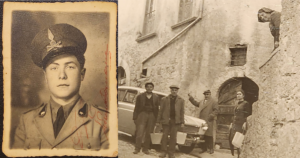“Every time that I have found myself inventing something in accordance with my old habits as a novelist, I have felt impelled at once to destroy [it], the places, events, and people are all real.”
Natalia Ginzburg (July 14, 1916–October 7, 1991) is regarded as Italy’s most important post 2nd World War female writer who was interned with her Jewish husband Leone during the 2nd World War in Pizzoli, Abruzzo, which sits just 15 km outside of L’Aquila. The most famous book of her time here is ‘Winter in Abruzzo’, read Helen’s mini-review but another great one that features her time here is her autobiographical novel, ‘Family Lexicon’ first published in 1963 and which won the Strega Prize. It tells the compelling story of her Italian family life with all its rituals as Mussolini and the Fascists’ grip tightened on the country and led to its race laws and partnering with Hitler in the 2nd World War. Natalia’s father was Jewish, and her mother was Catholic but her parents were secular and raised Natalia and her siblings as atheists. Here Anna Noble outlines the memoir but more importantly what to read to get up to speed on this chapter of Italian history before you begin.

 The story explores the experiences of family life in this extraordinary household, as intimately perceived by Natalia, during a dangerously precarious political period in Italian history. The 1930’s and early 1940’s. Unexpectedly, halfway through the book, we are told she marries Leone Ginzburg, a Russian Jew by birth, arriving in Italy as a child.
The story explores the experiences of family life in this extraordinary household, as intimately perceived by Natalia, during a dangerously precarious political period in Italian history. The 1930’s and early 1940’s. Unexpectedly, halfway through the book, we are told she marries Leone Ginzburg, a Russian Jew by birth, arriving in Italy as a child.
He was an antifascist and a notorious political activist, accustomed to being thrown into jail. It was known that he could be arrested at any moment or be sent into exile. Natalia felt her life was richer and happier with Leone and so when they were banished to the Abruzzo from Turin, she makes the best of living there with the other internees, rich and poor. Her fate will be tragic but she writes warmly about her stay there, the local people and being visited by both parents.
My intention is not to review the book but to advise the potential reader that there is little point in settling down with Family Lexicon unless you are very familiar with the background history of this period in Italy. An intelligent and entertaining way of doing this is to first read, A Bold and Dangerous Family by Caroline Moorehead.
The NYRB paperback edition 2017 of Family Lexicon has an informative Afterword by Peg Boyers (Poet and the executive editor of Salmagundi. She teaches poetry at Skidmore College) that can be read either in advance or after reading the story itself.




